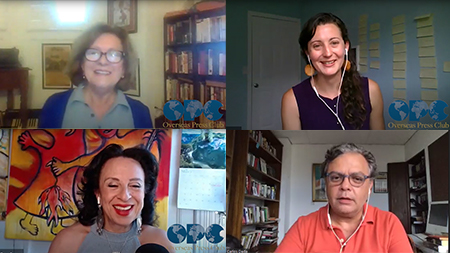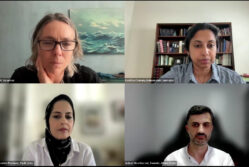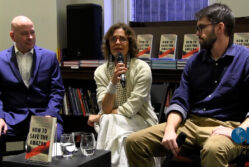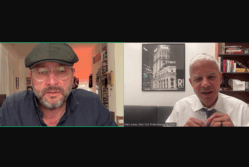Event Coverage Highlight

Experts on Central America Condemn Lack of Improvement in U.S. Immigration Policies
by Chad Bouchard
President Joseph Biden’s administration so far has not done enough to reverse restrictive immigration policies of former President Donald Trump, and in some cases might be worsening the situation for those displaced by oppressive conditions in Guatemala, Honduras and El Salvador, panel members said during a discussion on May 18 hosted by the OPC and the Pulitzer Center on Crisis Reporting.
Kate Morrissey, an immigration reporter for the San Diego Union-Tribune, said many people who follow U.S. immigration issues expected policies under the Biden administration to change.
“By and large, the effect of U.S. policy on people who are fleeing for their lives has not changed,” she said.
Morrissey said a key reason for the lack of change is Title 42, a measure imposed in March 2020 that is still in effect and blocks people who lack official travel documents from crossing into the U.S. because of the pandemic. The ban includes asylum seekers and people fleeing violence and undermines a screening process that is crucial to asylum law and international treaties.
Though the Biden administration has decided to generally no longer expel unaccompanied children, Morrissey said, “some parents who I’ve met have made the decision after being expelled as a family to say ‘ok, my child is in such danger here at the border in Mexico, I’m going to send my child across alone because that way my child is safe.’”
Maria Hinojosa, president and founder of Futuro Media, said the Biden administration has missed an opportunity to change the narrative on immigration. Part of the problem is that by comparison anything is better than the Trump administration, who “lowered the bar so low that taking children away as a form of punishment became normalized in the United States.”
She said as someone who has been covering Central America and immigration issues since the 1980s, she is not happy with the lack of change under Biden.
“Imagine if the Biden administration completely reframed the whole conversation around immigration and refugees,” Hinojosa said. “The Biden administration could actually lock in the Latino-Latina vote and the immigrant vote for decades to come if they flipped the narrative. But that takes extraordinary leadership and extraordinary risk, and that’s why I’m very impatient because I don’t think anybody is prepared to do either of those things on the issue of immigration.”
Hinojosa added that many women migrants face domestic violence and sexual assault against women “that is unrelenting,” and migrants who are members of the LGBTQ community are also fleeing violence.
Carlos Dada, a founder and director of El Faro, a news website established in El Salvador in 1998, said key reasons for people leaving El Salvador include violence from criminal gangs like MS-13 and wars among drug cartels, corruption, a failing economy, and climate change. Years of severe drought, he said, stem not only from global climate change but from dams that have closed off irrigation for subsistence farmers.
“So those lands are not producing food anymore. What you saw over the last year, in Honduras but also in Guatemala, is the vulnerability of people subject to natural disasters.”
Two back-to-back Category-4 Hurricanes, Eta and Iota, struck the region in November 2020, displacing hundreds of thousands of people who fled to other countries but were retuned by authorities. “And then they are trapped, imprisoned in their own countries because they can’t go back to their homes,” he said.
He said U.S. policy decisions have had a direct impact on Central America over the last 150 years, and now the region’s democracies are in the process of dismantling. Dada added that the situation is worsened by a lack of unity in U.S. approach to Central America.
“The United States, for us, is a collection of different agencies with different agendas. In Honduras since the coup d’état in 2009, there’s two different U.S. agendas that have been clashing,” he said, citing the Justice Department and Drug Enforcement Administration’s war on drug traffickers in conflict with the State Department agenda of supporting President Juan Orlando Hernández and turning a blind eye against collusion in trafficking and election fraud in 2018.
Hinojosa and Morrissey both won OPC awards this year. Hinojosa was part of a group that won The Lowell Thomas Award for Best radio, audio, or podcast coverage of international affairs for “The Moving Border.”
Tracy Wilkinson, senior foreign policy writer for the Los Angeles Times and a longtime OPC member, lead the discussion. Wilkinson has won multiple OPC awards for her coverage of Mexico and migrants.
Click the window below to watch video clips from the program.




